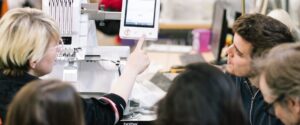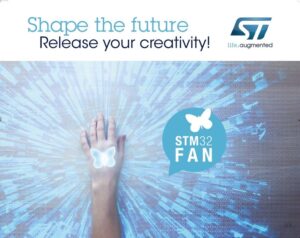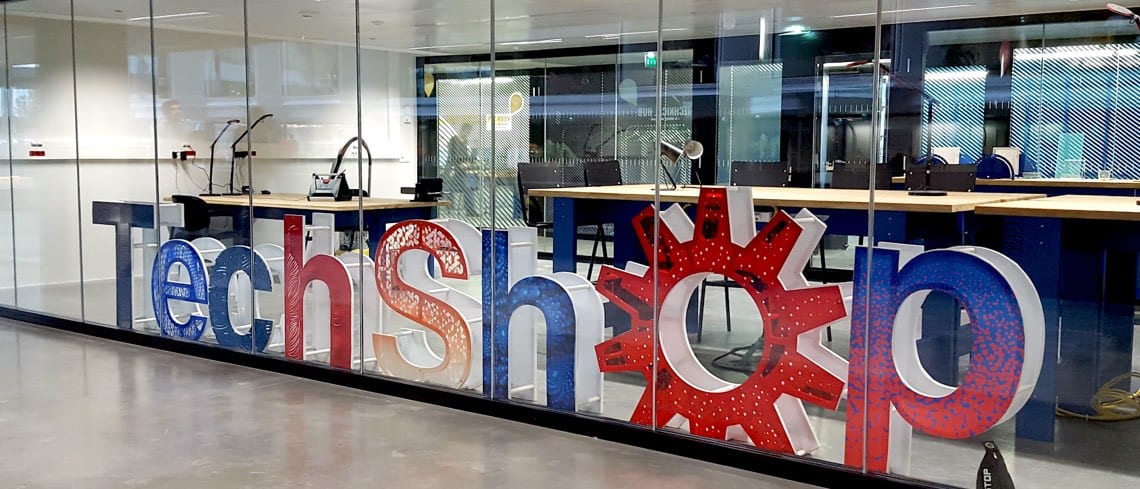Yesterday, TechShop officially inaugurated its new prototyping lab in Station F and ST is glad to have a front seat helping engineers take their projects off the ground. Station F is the biggest startup campus in the world. The 58-meter-wide and 310-meter-long building can house a thousand startups in Paris, France, to foster innovation. Hence, the location is also home to venture capitalists and funding groups, French administrative offices, and service providers, such as Amazon Web Services, GitHub, Airbnb, Microsoft, and Facebook, to name a few. It was thus natural for TechShop to occupy one of the largest spaces within this campus.
TechShop is a membership-based workshop with already two locations in France, (Lille and Ivry) that house “makerspaces”. Very simply, these are work environments where engineers can learn and collaborate with experts while also enjoying easy access to equipment like 3D printers, laser cutters, CNC machines, and bench-top drills presses, among others. Prototyping is, therefore, more straightforward since it’s possible to work on PCBs, plastic, woods, or metals and allow startups to take these first few steps that are so fundamental in the early days of a project, and which will be crucial in getting funding and talent. The TechShop space in Station F will have some of these machines as well as a strong emphasis on electronics, which explains why ST is proud to be part of this endeavor that will ensure this newest makerspace is much more than just a makerspace.
It’s Also a Launchpad for Ideas
When people first reach the TechShop area in Station F, they encounter the Agora Zone, a place where makers can purchase specific parts and accessories, such as filaments for a 3D printer, to ensure their ideas can take shape as fast and as naturally as possible. This is precisely why we worked with TechShop so the Agora Zone would also offer various Nucleo boards for free to members of the makerspace. As they evaluate their needs, we can help them start their projects immediately, and the first feedback we got is fantastic. Indeed, although the inauguration was yesterday, TechShop began welcoming engineers last December, and it’s a pleasure to see their enthusiasm and creativity as they start to build on our platforms.
Because we want to reach as many engineers as possible, we offer a wide selection of boards. For instance, we couldn’t resist making our NUCLEO-F401RE and NUCLEO-L476RG available. Since a considerable number of our STM32 ODE (Open Development Environment) Function Packs include pre-compiled binaries for these two boards, and since they are at the center of a lot of our documentation, such as our 6LoWPAN Tutorial, any TechShop member has instantly access to one of the most impressive array of algorithms, application examples, source codes, and binaries, by simply choosing one of these development boards. Furthermore, when engineers want to expand their feature set, they can easily order one of our many expansion cards at specialized resellers, or even Amazon, to quickly add sensors, wireless protocols, and much more.
It’s Also the Root of All Projects

However, offering some of our most popular platforms was not enough, which is why we also make our NUCLEO-L053R8 available for free. The board includes our STM32L053R8, a microcontroller (MCU) that demands only 0.27 µA in Standby mode, but that can go up to 32 MHz if need be, making it a very popular component in IoT devices. Engineers looking to build small systems that must run on tiny batteries for a really long time thus get to also enjoy lots of features, such as a DAC, ultra-low power comparators, and 16-bit timers. Similarly, teams aiming for small devices without the added constraint of low power consumption will gladly direct their attention to the NUCLEO-L432KC, a development board with an Arduino nano connector to help teams experiment with design constraints and reach the smallest form factor possible.
ST also covers the other end of the spectrum by offering the NUCLEO-F746ZG, one of our most powerful systems today. The STM32F746ZG on the board uses 144 pins, a Cortex-M7 running at up to 216 MHz, up to 1 MB of Flash, and it even includes hardware units to better experiment with LCD screens and a plethora of peripherals. Universities and companies use the STM32F7 family of MCU for a wide range of application, from aviation control to medical appliances. Hence, regardless of their power consumption constraints or computational needs, teams can find the right board that will help them move faster to TechShop’s machines and platforms so they can quickly show their prototypes to the world.
It’s Also the Right Place at the Right Time

During the journey from the drawing board to the finished prototype, TechShop also provides a network of experts in various fields to ensure no one gets stuck. The most obvious support takes the form of training that guarantee members will safely and efficiently use the machines or professional software at their disposal. Engineers also have access to project mentors who will guide them through processes, provide expertise on design and materials, review their approaches to specific constraints, and contribute personally if necessary. As invaluable as the development boards and machines themselves, the exchange of ideas and the creation of human networks will shape TechShop members for the rest of their careers.
This is the reason why ST is also committing to offering more than development boards. Indeed, our engineers and experts will meet with TechShop members to exchange documentation, ideas, expertise, and knowledge, so we can answer their questions faster and help them optimize their solutions. Putting boards in their hands is only part of our objectives. As we showed when we announced our partnership with the EISEE Connect Project, and as we are demonstrating now, we also want to be a bedrock for the next generation of leaders and innovators that will change the world. As a result, we aim to bring the ecosystem of our Partners Program to all makers, so they can ultimately transition from a prototype built with TechShop to a final product ready for commercialization.
